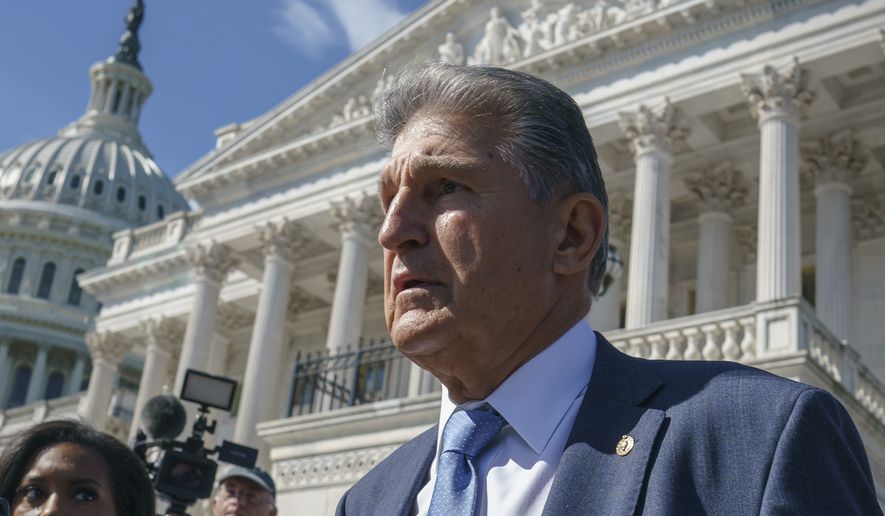Sen. Joe Manchin III, a key swing vote for the White House’s legislative agenda, signaled Monday that a broad agreement among Democrats on President Biden’s multi-trillion dollar social spending bill could be at hand.
Mr. Manchin, West Virginia Democrat, said a final agreement could be reached by the end of the week even though there are still significant issues to be addressed.
“Having it finished with all the t’s and the i’s and everything crossed and dotted that will be difficult from the Senate side because we have an awful lot of text to go through,” he said. “But, as far as conceptually, we should.”
The comments came one day after Mr. Manchin and Senate Majority Leader Charles E. Schumer met with Mr. Biden in Delaware. During the discussion, Mr. Biden stressed the need to finalize the spending bill before the United Nations Climate Change Conference in Scotland next week.
“It would be very, very positive to get it done before the trip,” Mr. Biden told reporters on Monday before departing for a campaign swing through New Jersey.
The White House initially wanted the bill to run upward of $3.5 trillion and include long-sought liberal priorities such as free community college, amnesty for illegal immigrants and more climate change regulations.
After Mr. Manchin and another moderate Democrat, Sen. Kyrsten Sinema of Arizona, raised objections, the White House was forced to retreat.
The moderates’ influence stems from the fact that Democrats plan to pass the spending bill using budget reconciliation. The special legislative procedure allows some spending bills to avoid the Senate 60-vote filibuster threshold and pass by a simple majority of 51 votes.
Since the Senate is currently split 50-50 between both parties, any single lawmaker can exert significant influence over the negotiations. At the moment, Mr. Manchin and Ms. Sinema have done exactly that, forcing Mr. Biden to scale back the price tag of the bill from $3.5 trillion to $2.2 trillion.
“We’re all working in good faith,” said Mr. Manchin. “I’ve been talking to everybody as you know. I think we’ve got a good understanding of each other better than we ever have.”
Dropped by the wayside has been Mr. Biden’s proposal to grant two free years of community college, regardless of citizenship. Also out is a tax credit scheme that many hoped would force electric utility companies to abandon coal and natural gas in favor of wind and solar power.
The deal still includes money for a universal pre-kindergarten program and child-care subsidies, though both are likely to be means-tested. Money is also earmarked for the transition of the federal fleet of vehicles to electricity. A further $3.5 billion would be spent on creating a “civilian climate corps” program to employ youths to plant trees.
Mr. Biden has been forced to further limit his ambitions when it comes to the child tax credit and paid family leave.
The package is now only likely to include 4 weeks of paid leave, rather than the 12 originally floated by the White House. Similarly, the expansion of the child tax credit will only be extended for another year.
The White House initially proposed to make the credit permanent, which gives parents with children under the age of 6 approximately $3,600 in direct payments annually.
“I’ve always said that I believe that government should be your best partner but it shouldn’t be your provider,” said Mr. Manchin. “We have a moral obligation to provide to those who have incapacities such as physical or mental. But everyone else should be able to help and chip in and all that.”
Despite Mr. Manchin’s optimism about an agreement being possible, it remains to be seen whether far-left Democrats will sign onto the package.
Many, including Sen. Bernard Sanders of Vermont, have long argued that the $3.5 trillion initially proposed by Mr. Biden was already enough of a compromise.
• Haris Alic can be reached at halic@washingtontimes.com.




Please read our comment policy before commenting.